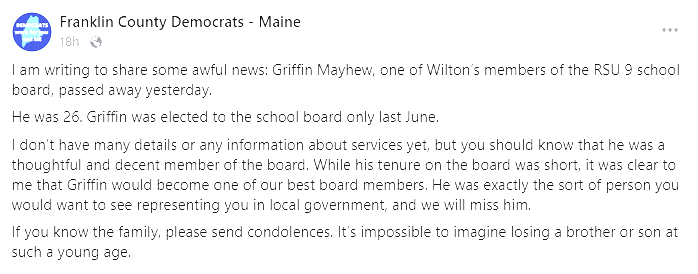Maine
Service, not ideology, is why I’m running for the Maine House | Opinion

Corey Bouchard is a Democratic candidate for the Maine House of Representatives in District 88.
As an Army veteran, I was taught that effective leadership is defined not by how loudly you speak, but by the tangible results you achieve. Our community in Maine House District 88 deserves a representative who is focused on solutions, fiscal discipline and the hard work of lowering costs for working families — not advancing an extreme, divisive ideology.
That is why I am running for the Maine House, and why the current direction under my opponent, Rep. Quentin Chapman, must change.
We face serious challenges in Maine: a crippling workforce shortage, high energy costs and a community struggling with the opioid crisis. These problems demand sober, strategic action. Unfortunately, Rep. Chapman’s record demonstrates a troubling priority: consistently putting his personal ideological agenda ahead of pragmatic solutions.
Rep. Chapman has shown where his focus lies through his votes and the legislation he chooses to sponsor.
While working families desperately need relief, Rep. Chapman has spent his time supporting measures that divide our community and waste legislative energy. For example, in a vote that demonstrates a fundamental neglect for the safety of our most vulnerable, Rep. Chapman voted against the bill that increased punishment for doxxing a child. This type of action signals a clear failure to prioritize basic public safety.
Even more concerning is his dedication to advancing radical social positions. He actively sponsored LD 1230, “An Act to Abolish the 72-hour Waiting Period for a Gun Purchase,” demonstrating a commitment to eroding common-sense safety measures that are proven to reduce impulse violence and suicide. This divisive posturing does not make our streets safer or our economy stronger. It simply serves to alienate segments of our community and distract the Legislature from its core mission.
His record further underscores this ideological commitment. This is not the voice of service; it is the voice of exclusion. We need a representative committed to the constitutional principle that the rule of law applies equally to all Mainers, without exception.
My approach is rooted in discipline and facts, not chaos and rhetoric. I am running because I believe in a Maine where governance is about common sense and accountability. My policy agenda focuses on core principles that will benefit everyone in District 88:
- Workforce investment: I support universal voluntary pre-K for 3- and 4-year-olds as the smartest long-term economic investment to address our workforce crisis.
- Small business support: We need a Small Business Apprenticeship Tax Credit to reward local companies for closing the skills gap and creating jobs.
- Honoring veterans: We must cut bureaucratic red tape by implementing MOC reciprocity to ensure veterans and their spouses can work in Maine immediately upon moving here.
- Affordable energy: We must reduce heating bills through long-term infrastructure. I will expand weatherization tax rebates for low- and middle-income families, providing relief that pays for itself.
- Health care transparency: We need a competitive marketplace. I will fight for pharmacy benefit manager reform and a Prescription Drug Price Transparency Act to stop secretive price-gouging by middlemen.
- Smarter public safety: We must fund Mobile Crisis Response Teams (MCRTs) to free up our police officers to focus on violent crime, reducing unnecessary emergency room visits and incarceration costs.
- Taxpayer protection: I support the Government Contract Transparency Act to ensure public money is not subsidizing corporate negligence or low wages.
- Political accountability: I advocate for State House leadership term limits to prevent entrenchment and ensure a continuous influx of new ideas and better representation.
- Equality under the law: I will fight for a state constitutional amendment to explicitly secure non-discrimination protections for all Mainers because equality is a founding constitutional principle.
My campaign is a mission for common sense. We cannot afford another term of a representative who prioritizes national political theater over the pressing needs of our neighbors. The stakes are too high.
I urge the voters of District 88 to choose service and solutions over ideology and division. Send a representative to Augusta — like me — who will put the dignity of every Mainer and the health of our economy first.

Maine
Charter Communications lays off 176 Maine employees

PORTLAND, Maine (WGME) — Charter Communications, which owns Spectrum, is laying off 176 workers in Maine.
A company spokesperson said 176 employees were informed on Wednesday about the layoffs.
Charter Communications said it is transitioning the work done at the Portland call center to other U.S.-based centers effective immediately.
“Employees may relocate in their current role to select customer service locations and are eligible for relocation benefits. They will continue to receive regular pay for 90 days; severance and eligible benefits will begin afterward for those who do not relocate. Impacted employees may also apply for any open role for which they are qualified,” a company spokesperson said.
According to the Press Herald, the layoff is about a quarter of their Maine workforce.
Maine
Recently Elected 26-Year-Old Wilton School-Board Member Dies Unexpectedly

Regional School Unit (RSU) 9 school board member Griffin Mayhew, 26, representing Wilton, died unexpectedly on Monday, just months after he first took office in June.
[ Community Split Over Mt. Blue Principal’s Halloween Costume, But RSU 9 Confirms Black is Back on the Job…]
“Griffin was an exemplary young man whose commitment, kindness, and thoughtfulness were evident throughout his service on the Board along with his support of student activities at Mt. Blue Campus.
RSU 9, also known as the Mt. Blue Regional School, serves Chesterville, Farmington, Industry, New Sharon, New Vineyard, Starks, Temple, Vienna, Weld, and Wilton. Griffin became one of Wilton’s three RSU 9 Board of Directors members after defeating opponent Douglas Hiltz in a 209-146 vote.
The incumbent board member did not run for reelection.
Out of respect for Mayhew’s memory, the school district postponed the meeting scheduled for Tuesday.
“I don’t have many details or any information about services yet, but you should know that he was a thoughtful and decent member of the board. While his tenure on the board was short, it was clear to me that Griffin would become one of our best board members. He was exactly the sort of person you would want to see representing you in local government, and we will miss him,” said the Franklin County Democrats on Facebook.

Mayhew’s cause of death has not been released.

Maine
Portland Planning Board green lights Maine’s would-be tallest building

A nearly 400-foot tower that would transform Portland’s skyline moved one step closer to reality Tuesday night when it received unanimous approval from the city’s Planning Board.
The 30-story mixed-use, high-rise building is proposed for 45 Union St., adjacent to the Old Port.
Now, the developer will need to secure building permits, finalize financing and begin work on detailed construction documents. The project does not require any approval from the City Council.
The tower, proposed by Portland developer East Brown Cow Management LLC, would stand at 380 feet, making it far and away the state and city’s tallest building. It would include more than 70 residential units, commercial space, an 88-room hotel and a restaurant at the top, and is just one part of a project called Old Port Square, designed to fill an entire city block.
Portland updated its zoning laws last year with the goal of allowing growth in the city while preserving its character. The overhaul included an increased maximum height for buildings in some of the city’s major corridors, permitting buildings up to 380 feet in downtown.
On Tuesday night, the board heard presentations about traffic impacts of the proposal and reviewed the developer’s latest revisions to the application before receiving a final round of public comment.
That testimony, both in person at the meeting and in submitted written comments, was mixed.
Local organizations, including Greater Portland Landmarks and the Portland Regional Chamber of Commerce, expressed support for the project, describing it as a modern but thoughtful design that would transform an underutilized parking lot into a vibrant mixed-use space.
“This project shows that Portland can honor its history while preparing for its future,” said Thomas O’Boyle, director of advocacy at the chamber.
But other residents and local business owners criticized the building as an eyesore, whose height would disrupt Portland’s skyline and conflict with the city and Old Port’s historic character. Several commenters said the city, in need of more affordable housing, should prioritize those projects over new high-end apartments and a hotel.
In accordance with Portland’s inclusionary zoning rules, developers are planning to pay about $3.3 million into the city’s Jill C. Duson Housing Trust Fund in lieu of building affordable housing units.
During deliberations, the board acknowledged public concerns about the skyline and how it might visually transform the city, but noted that the applicants had met board standards. Members acknowledged that after raising the city’s maximum permitted downtown building heights last year, someone had to be the first to build in the new allowable space.
The planning board approved the project unanimously, although several members were absent.
The board also passed language requiring that if the developer makes major material or architectural changes that substantially differ from the approved plans, they must submit those changes to the board for review.
-

 Alaska5 days ago
Alaska5 days agoHowling Mat-Su winds leave thousands without power
-

 Politics1 week ago
Politics1 week agoTrump rips Somali community as federal agents reportedly eye Minnesota enforcement sweep
-
Ohio1 week ago
Who do the Ohio State Buckeyes hire as the next offensive coordinator?
-

 Texas5 days ago
Texas5 days agoTexas Tech football vs BYU live updates, start time, TV channel for Big 12 title
-

 News1 week ago
News1 week agoTrump threatens strikes on any country he claims makes drugs for US
-

 World1 week ago
World1 week agoHonduras election council member accuses colleague of ‘intimidation’
-

 Washington2 days ago
Washington2 days agoLIVE UPDATES: Mudslide, road closures across Western Washington
-

 Iowa4 days ago
Iowa4 days agoMatt Campbell reportedly bringing longtime Iowa State staffer to Penn State as 1st hire



















